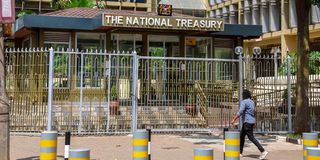Key projects face delays on 20pc agriculture budget cut

The National Treasury building in Nairobi.
What you need to know:
- Allocation to the State Department for Agriculture has fallen to Sh47.76 billion from Sh60.41 billion.
- Allocation to the State Department for Livestock Development has decreased to Sh10.58 billion from Sh14.98 billion.
The National Treasury has proposed a budget cut of 20.1 per cent to the agriculture sector, making it one of the biggest losers in the new budget, which will be the second under President William Ruto.
Cumulatively, agriculture-related dockets have been handed Sh69.64 billion, a significant decline from Sh87.19 billion in the current fiscal year ending next month.
This is despite the sector being the backbone of Kenya’s economy by contributing to more than a fifth of the country’s annual Gross Domestic Product (GDP) and supporting millions of livelihoods.
According to the tabled budget estimates for the financial year 2024/25, the Treasury has reduced the budget to the Ministry of Agriculture and Livestock Development from Sh75.39 billion in the current financial year to Sh58.34 billion, marking a Sh17.05 billion shaving.
Allocation to the State Department for Agriculture has fallen to Sh47.76 billion from Sh60.41 billion.
The budget cut is set to hit key programmes within the department, including land and crops development, food security initiatives, and agribusiness and market development.
Meanwhile, allocation to the State Department for Livestock Development has decreased to Sh10.58 billion from Sh14.98 billion.
This is also set to derail implementation of key projects, with major programmes such as livestock policy development, livestock production and management, livestock value addition and marketing facing significant funding cuts.
The Treasury has also slashed the budget for the State Department of Blue Economy and Fisheries from Sh11.8 billion to Sh11.3 billion.
Agriculture experts warn that the significant budget cuts to the agriculture sector are a threat to the country’s food security.
The Agriculture Sector Network (Asnet), a national lobby, said the proposed budgetary allocation for the agriculture sector is still a far cry from the 10 percent threshold mandated by the Comprehensive Africa Agriculture Development Programme under the Malabo Protocol.
“We implore the government to diversify public spending that crowds out the private sector and invest in enabling infrastructure,” said Asnet Chief Executive Agatha yesterday during a stakeholder conference in Nairobi.
Dr Timothy Njagi, an Agriculture expert with Egerton University’s Tegemeo Institute, urged the government to put in place mechanisms to attract investments from the private sector, donors and civil society to cover resource gaps.
Agriculture accounted for 21.2 per cent of the overall GDP in 2022 and employed more than 341,600 individuals directly, according to the Economic Survey 2023.
The sector has, however been facing a wide array of issues in recent years including budget cuts, persistent droughts and an increase in the cost of key inputs such as fertiliser, fuel and pesticides.
This has affected local production of key food crops such as maize, beans, rice, wheat among others, forcing the country to increasingly rely on imports especially from its neighbours to plug the deficit.





